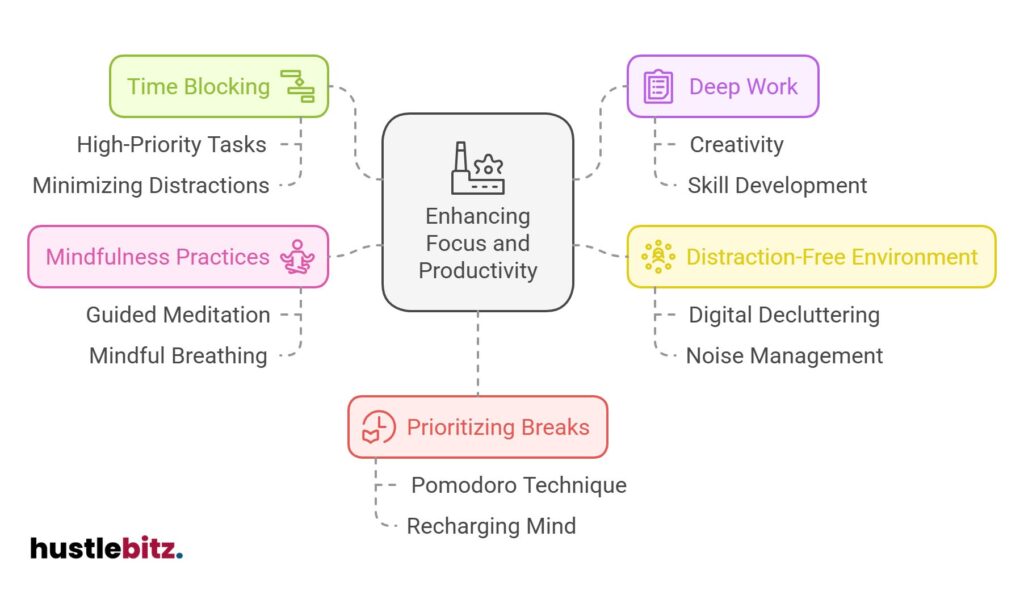To immediately improve your productivity, implement focused techniques like time blocking and the Pomodoro Technique. These strategies help create structured work periods with scheduled breaks, enhancing concentration and preventing burnout. Additionally, cultivate an optimal environment by minimizing distractions—this can include digital decluttering and noise control. Incorporating mindfulness practices, such as mindful breathing and gratitude journaling, fosters mental clarity and reduces stress. Prioritize tasks using the urgency matrix to focus on high-impact activities that align with your goals. Explore further techniques to harness your focus effectively and elevate your productivity.
Key Takeaways
- Implement time blocking to allocate specific periods for high-priority tasks, minimizing distractions and enhancing focus.
- Engage in deep work sessions to tackle cognitively demanding tasks without interruptions, fostering creativity and skill development.
- Create a distraction-free environment by decluttering digital spaces and managing noise levels to improve concentration.
- Incorporate mindfulness practices, such as guided meditation and mindful breathing, to enhance focus and reduce stress.
- Prioritize breaks using techniques like the Pomodoro Technique to recharge your mind and maintain sustained attention throughout the day.

Connection Between Focus and Productivity

Consistently maintaining focus is crucial for enhancing productivity, as it enables individuals to direct their mental resources towards completing tasks efficiently and effectively. In the contemporary workplace, distractions abound, leading to cognitive overload and a diminished attention span.
Task management strategies play a pivotal role in countering these challenges. Employing focus techniques such as time blocking allows individuals to allocate specific periods for concentrated work, minimizing the temptation to multitask—a common misconception that often detracts from performance.
Goal setting is another powerful focus technique that can streamline efforts and ensure clarity in objectives. By establishing clear and attainable goals, employees can better align their daily activities with organizational priorities, fostering a robust workplace culture centered around productivity.
Additionally, engaging in a digital detox can significantly enhance mental clarity, as it reduces the barrage of notifications and online distractions that fragment focus.
Moreover, addressing multitasking myths is essential. Research indicates that switching between tasks can lead to a decrease in overall efficiency, contrary to the belief that juggling multiple responsibilities enhances productivity.
The Power of Deep Work: How to Cultivate Intense Focus
Building on the understanding that focus is vital for productivity, the concept of deep work emerges as a transformative approach to cultivating intense concentration and achieving significant results in a distraction-laden environment.
Deep work refers to the ability to engage in cognitively demanding tasks without distractions, enabling individuals to reach a state of cognitive flow where their attention span is maximized.
To harness the power of deep work, one must implement focused sessions, where specific blocks of time are allocated to task immersion. This method, often referred to as time blocking, allows individuals to dedicate uninterrupted periods to high-priority tasks, promoting goal alignment and enhancing productivity.
During these sessions, distractions must be managed effectively to maintain a strong focus and mental resilience.
Cultivating creative focus is essential for producing quality work. Engaging in deep work not only sharpens one’s skills but also fosters a sense of accomplishment, encouraging further commitment to the tasks at hand.
By regularly practicing deep work, individuals can gradually extend their attention span, making it easier to tackle complex challenges.
Moreover, developing mental resilience through deep work enables individuals to overcome obstacles and distractions that arise during their professional endeavors.
Eliminate Distractions: Creating a Productive Environment

Creating a productive environment requires a strategic approach to eliminating distractions that hinder focus and impede progress. By cultivating distraction-free zones and implementing effective workspace organization, individuals can significantly enhance their productivity.
Here are three key strategies to consider:
- Digital Decluttering: Begin by organizing your digital workspace. Remove unnecessary files, limit open tabs, and unsubscribe from distracting notifications. This helps create a focused digital environment conducive to concentration.
- Noise Control: Implement noise control measures to minimize auditory distractions. Consider using soundproofing materials or white noise machines to create a serene atmosphere. If possible, designate quiet hours and establish technology boundaries to maintain focus.
- Environmental Adjustments: Enhance your workspace with thoughtful adjustments. Integrate plants for their calming effect and improved air quality. Utilize lighting adjustments to ensure that your workspace is well-lit yet comfortable, and incorporate visual cues that remind you of your goals. Scent stimulation, such as essential oils, can also promote concentration and alertness.
Incorporating time blocking into your routine allows for dedicated focus periods, further reinforcing the productivity framework. By addressing these elements, you can transform your workspace into a haven for concentration, free from distractions.
Ultimately, the goal is to create an environment that not only fosters focus but also encourages productivity, empowering you to achieve your objectives efficiently.
Mindfulness Practices to Enhance Focus and Reduce Stress

In addition to cultivating a distraction-free environment, incorporating mindfulness practices can significantly enhance focus and reduce stress, fostering a more productive mindset. Mindfulness encourages individuals to engage fully in the present moment, which can be achieved through various techniques.
One effective method is mindful breathing, where you focus on your breath to anchor your attention. Additionally, a body scan can help you become aware of physical tension, allowing you to release stress and improve concentration. Guided meditation sessions are also beneficial, providing structured focus and relaxation, while visualization techniques can help you mentally prepare for tasks ahead.
Incorporating gratitude journaling into your routine promotes a positive mindset, reducing anxiety and enhancing clarity. Engaging in nature immersion can further elevate your mood and focus, as being in nature has been shown to reduce stress levels. Similarly, mindful walking encourages awareness of your surroundings, fostering a sense of calm and clarity.
To combat the distractions of modern life, a digital detox can be invaluable. Limiting screen time allows your mind to reset and concentrate more effectively on essential tasks. Cultivating sensory awareness through focused listening or tuning into your environment can also sharpen your focus.
Prioritization Strategies: Focusing on What Truly Matters
Effective prioritization strategies are essential for individuals seeking to focus on what truly matters in their work and personal lives. By implementing structured approaches, one can enhance decision making, optimize resource allocation, and ensure goal alignment.
Here are three effective strategies to consider:
- Urgency Matrix: This tool helps categorize tasks based on their urgency and importance, allowing individuals to focus on high-impact activities. By assessing the urgency and value of each task, you can effectively allocate your time and efforts.
- Time Blocking: This technique involves allocating specific blocks of time for different tasks, which enables better focus and reduces distractions. By planning your day in advance, you can ensure that critical tasks receive the attention they deserve.
- Impact Assessment: Evaluating the potential impact of tasks on your long-term goals is crucial. Conducting a value analysis and effort estimation for each task enables you to prioritize those that will yield the greatest results.
Incorporating these strategies into your routine will enhance strategic planning and task delegation. By focusing on what truly matters, you can maximize productivity and create a framework for ongoing success.
Break Management: The Importance of Rest in Maintaining Focus

Break management plays a crucial role in maintaining focus and enhancing overall productivity, as regular intervals of rest allow the mind to recharge and refocus on tasks at hand. Understanding the importance of break length is essential for effective energy management; too long a pause can disrupt productivity cycles, while too short may not provide adequate mental rejuvenation.
Scheduled pauses, often referred to as restorative breaks, can significantly enhance cognitive rest, allowing individuals to return to their work with renewed focus. Research suggests that these breaks not only reduce fatigue but also facilitate task switching, enabling a smoother transition between different activities. This shift can lead to a creativity boost, as fresh perspectives emerge after periods of disengagement from intense focus.
Incorporating structured breaks into the workday can optimize productivity. For instance, the Pomodoro Technique, which advocates working for 25 minutes followed by a 5-minute break, exemplifies effective break management. This method aligns with the principles of focus recharge, allowing for sustained attention over longer periods without mental exhaustion.
Ultimately, recognizing the value of restorative breaks is vital for anyone seeking to enhance their productivity. By prioritizing breaks as an integral part of the workflow, individuals can cultivate a more focused mindset, thereby improving overall efficiency and effectiveness in their tasks. Embracing break management is not merely about pausing work; it is about enabling a cycle of renewed energy and enhanced performance.
Final Thoughts
Improving your productivity requires a blend of effective focus techniques and mindful practices. By incorporating methods like time blocking, deep work sessions, and mindfulness exercises, you can create an environment and mindset conducive to sustained focus. Prioritizing tasks and managing breaks are equally essential for maintaining high energy levels and mental clarity. As you integrate these strategies into your daily routine, you’ll find that not only does your productivity increase, but your overall well-being and satisfaction with your work do too. Remember, productivity is about working smarter, not harder—stay consistent, and the results will follow.




